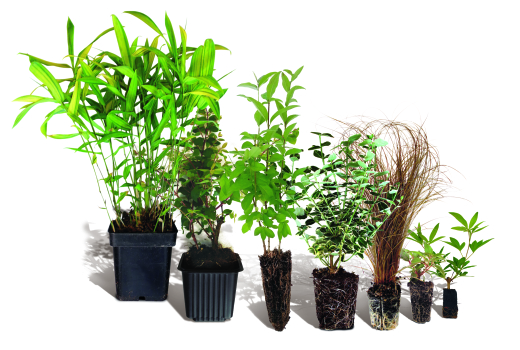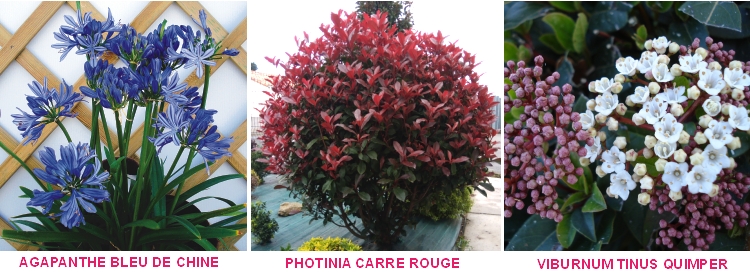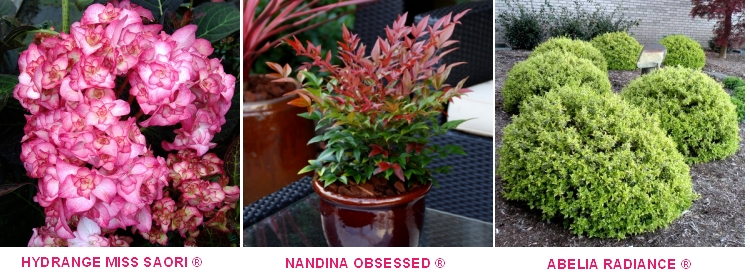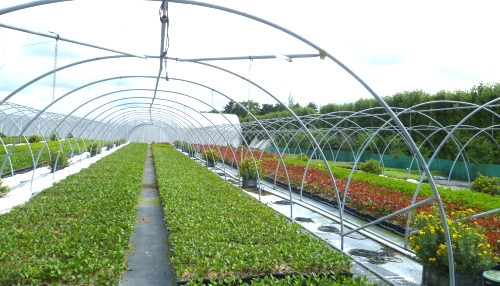Established in 1988 and located in France, South of Nantes, our nursery is specialised in propagation and growth of young plants. Our climate, influenced by the river Loire and also the proximity of the Atlantic ocean, allow us to grow a large range of plants : 2000 sorts of plants, trees, shrubs, perennials, bamboos, grasses (poaceae), rose’s bushes, little fruits’ trees, etc… that our teams look after every years.
Our young plants specialties for the professionals

The different types of plants that we present have been tested and are recognized for their agronomic and decorative qualities. More than just a classical range of plants that had proved their worth for a long time, we are the root of “home” selection descended from our mother stocks. Furthermore, we work together with well-known holders and diffusers of added value’s new varieties network. This network allows us to propose you a hundred of novelties every year (some of them only exist in our garden centre).
LAFORET’S SELECTION:
The Photinia Carré Rouge & Red Select, the Agapanthe Bleu de Chine, the Abelia chinensis White Surprise, the Phillyrea angustifolia Pisto or the Viburnum tinus Quimper came from our mother stocks.

The plants under the ® certification:
The protected plants’ varieties are along with a global marketing communication so as to broadcast fast their assets beside the distributors. They provide added value and originality. Every year, we put forward a selection of our prettiest novelties. The Nandina Twilight ® (Innovert d’Argent 2016), the Abelia Radiance ®, the Hydrangea Miss Saori ®, the Delosperma Wheel of Wonder ®, the Salvia Pink Lips ®, the Ilex Luxus Globe ® had become unmissable.

our varietal’s collections:
We are also specialised in several species and varieties’ diversifications such as : Agapanthes, Abelia, Bamboo Fargesia (non-invasive), Bananiers rustiques (rustic style banana tree), Cordylines, Dianella, Euphorbes, Gauras, Geranium perennials, Hortensia, Ilex crenata, Magnolia grandiflora, Nandina, Osmanthus, Phormium, Photinia, Pittosporum, Viburnum, etc…
the young plants’ SOLUTION:
To answer the different stakes that concern the arrangement and our clients’ (private individual) expectations, we suggest crossed and compatible eye on our varietal’s range: box tree’ s stand-in plants, dry soil plants, graphic courtyard’s plants, urban garden’s plants, grassy and ground-cover plants, seaside plants, natural garden plants, melliferous plants, allelopathic plants, Health and Well-being, etc... Every single solution progresses yearly according to varietal’s novelties.
An environmentally responsible production dedicated to the nursery’s young plants
 The nursery is organised around 2 main steps of the young plants’ production: the first one is the growth site with the mother stocks’ park and the cutting’s rooting and acclimatisation’s units. The second one is the growing site from the re-potting to the formed young plants’ dispatch.
The nursery is organised around 2 main steps of the young plants’ production: the first one is the growth site with the mother stocks’ park and the cutting’s rooting and acclimatisation’s units. The second one is the growing site from the re-potting to the formed young plants’ dispatch.
LAFORET Plants’ Solutions in figures:
- 2 ten or so hectares
- 4 ha of mother stocks
- 8 ha of soilless cultivation
- 5 ha of covered growing
- 2500000 plugs produced every year
- 2000000 young plants re-potted yearly
The young plants PROPAGATION:
Our young plants came from cutting, seedlings or in-vitro. The cuttings are established in our taking cutting and pricking out’s unit. The in-vitro’s plants are produced by different collaborators’ laboratories. We insure the pricking out and the rooting of the plants at the third step.

the young plants’ GROWING:
The young plants are re-potted in small pots, as a set of 28, as a set of 40 and previous containers of 1 or 2L. The growing’s cycle is variable according to the species, the length is between 3 and 18 months. According to the species’ characterisations the growing occurs under a protection, outdoors or both.
The varietal’s authenticy is absolutely controlled at every single step of the production: the mother stock’s labelling, the multiplied bundles and the re-potted one. We insure a precise traceability of any set produced in our nursery.

Our commitments for an environmentally rensponsible production
Our company have been one of the first in France to be certified Plante Bleue Haute Valeur Environnementale to emphasise its commitment in responsible, ecological and social’s practices. All our teams are concerned by that subject and aim for its accomplishment.
This certification encourage us to use methods and technical alternatives concerning the different steps of the production.
- DEPHY FERME: The nursery is a part of the group named Dephy Ferme, carried by the BHR (Regional Horticultural Committee, located in Angers) since 2016. The aim is to reduce the use of phytosanitary products of 50% every 5 years. The priorities are the reduction of the use of weedkiller and the improvement of our process (choose carefully the product according to the objective, adjust the equipment). In concrete terms, we are a group of 10 nursery owners that exchange and work together in order to find proper alternatives that will avoid the use of phytosanitary products. For instance, we use substitutes to handle our devastated growing, we cover with grass our path for avoiding the use of weedkillers and we also protect our plants from diseases with natural protectors such as tea or worm compost system’s juice. Between 2014 and 2016, we succeeded in reducing of 50% the number of products that we used. We continue our efforts in this way.
- FERTILISATION AND IRRIGATION: We reduce our water consumption with covered growing, night’s watering, young plants’ straw-mulching, collecting rainy water and drainage. The retrieved drainage’s water came into a phyto-purified lagooning’s area. We use slow-release fertiliser. Every contribution is reasonable and subdivided.
- GROWINGS’ PROTECTION: We limit the use of phytosanitary products according to the growing’s needs. The nursery makes alternative methods its first choice such as the Integrated Organic Protection (with auxiliaries’ release but also the creation of environments that promote the development of auxiliaries which are naturally present thanks to assistance plants’ use). For example: reserve hedges made up with elderberry, hazel tree and hornbeam, sorbaria and potentillas’ plantation for the pollen, orthorhynques’ egg-laying, etc…We regularly use worm compost system’s juice which enables us to stimulate the natural defences of the young plants. We also contribute to the SBT network (Organic Territory Surveillance) in the Vegetable Health Report’ writing.
- SELF-PROPAGATING PLANTS’ MANAGEMENT: Since 2013, we take part in the alt’herb club (BHR) by exchanging with the different producers about methods that enable us to manage the grass rate in our growing, in the hedges or between the greenhouses. Many straw-mulching are tested every year on the soilless growing. Concerning the outdoor cultivations of mother stocks, we bring yearly a new straw bed which reduce the watering and prevent us from weed’s propagation.
- STANDARD RESPECT AND REGULATIONS: The phytosanitary hubs respect the standards therefore they are controlled yearly. The mix’s volumes are precisely calculated according to the treatment that we need. The rinse takes place in the field and the effluent are treated by an osmofilm’s station. The decision-makers and the workers have their phytosanitary certification.
- GARBAGE’S TREATMENT: well-worn earthenware, cardboards, tarpaulin, EVPP, PPNU are recycled thanks to adapted chains. We have realised a composting of our natural garbages too (deadheading, cutting and compost wastes). Then we take advantage of this composting in the mother stocks’ growing.
This is in working on all these levers that LAFORET Plants’ Solutions became the first French Company certified Plante Bleue 3 Haute Valeur Environnementale in June 2017. The third level is based on quantitative indicators that measure the environmental’ s performance in 7 thematics: biodiversity, fertilisation, irrigation, phytosanitary, energy, waste and social.
